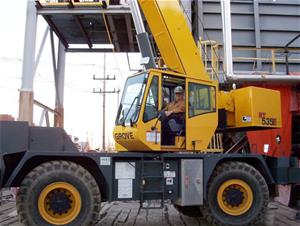CCO Operator Profiles - Duane Schmader
 Duane Schmader has been operating carrydeck and rough terrain cranes for more than 30 years, and he has been CCO certified to operate mobile cranes since 1997.
Duane Schmader has been operating carrydeck and rough terrain cranes for more than 30 years, and he has been CCO certified to operate mobile cranes since 1997.
Starting out as a carpenter working for United Refining Company, an oil refinery in northwest Pennsylvania, Duane got into rigging, and in 1978 he started operating the refinery’s rough terrain cranes. "Back then we learned mostly by the seat of our pants,” he says. “When your outriggers started to pull up, you knew you had to back off."
He’d had some classroom training and had earned his heavy equipment operator license in the ’80s. But when CCO certification became available, the refinery encouraged their operators to get certified, even paying for their training and tests through IUOE Locals 95 and 66. "Obtaining my CCO crane operator certification made me learn about aspects of the job that I didn’t know before, such as the OSHA, ANSI, and other applicable standards, which in turn helped me operate in a safer manner,” Duane says. With more knowledge, he and his fellow operators began operating more safely and taking fewer risks. "And once management saw the accident rate drop, they realized that crane operator certification makes good business sense."
Duane sees NCCCO’s recently announced new national Crane Inspector certification program as filling a real need not least because it will require crane inspections to be more consistent. The issue is particularly apparent when the refinery shuts down to perform maintenance and brings in extra rented cranes to get the work done faster. "More uniform requirements for crane inspections should definitely make the cranes themselves safer," Duane says.
Similarly, Duane sees NCCCO’s Rigger and Signalperson certifications as valuable. "It would be very helpful for everyone to have a consistent education and to know exactly what their responsibilities are," he says. Duane recommends CCO certification to co-workers and supervisors because, as he has experienced, "if workers know you are certified, they generally feel better about working with you."
The refinery has recently begun CCO testing on site, and Duane has helped prepare the practical test courses. Duane feels so strongly about the benefits of CCO certification that he would like to increase his involvement with NCCCO programs. He has provided some rigging training at the refinery in the past, and he is considering becoming an NCCCO Practical Examiner.
When he’s not working, Duane enjoys taking rides on his Harley and doing landscaping work around the house with his wife.